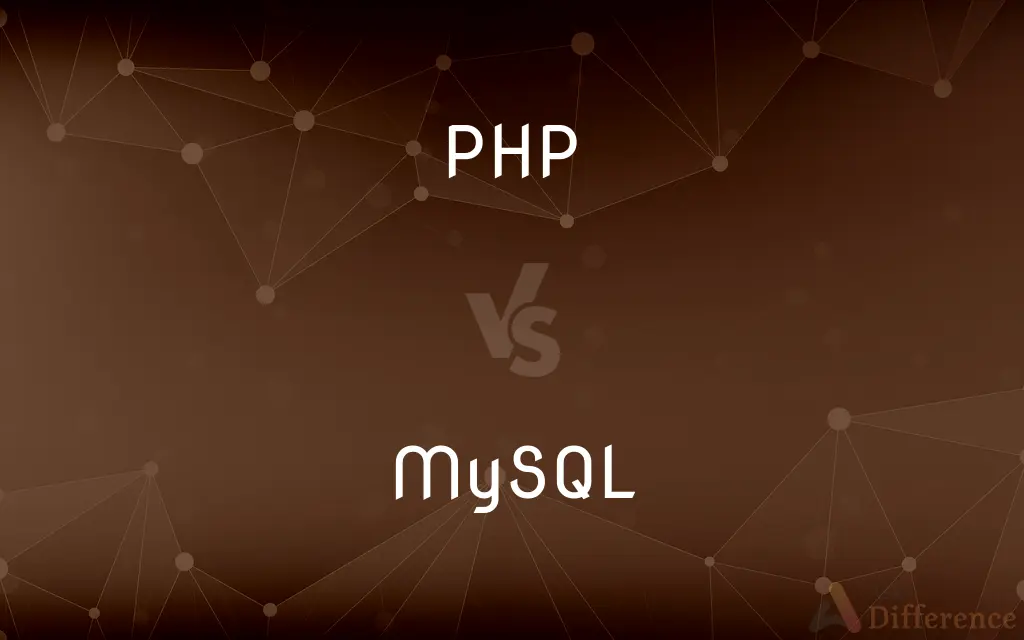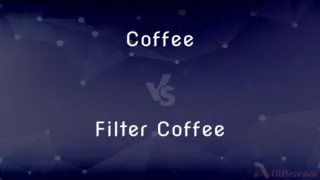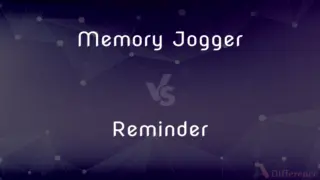PHP vs. MySQL — What's the Difference?
By Tayyaba Rehman — Published on November 14, 2023
PHP is a server-side scripting language designed for web development, while MySQL is an open-source relational database management system. Both can work together in web development.

Difference Between PHP and MySQL
Table of Contents
ADVERTISEMENT
Key Differences
PHP, an acronym for Hypertext Preprocessor, is widely recognized in the world of web development as a language that facilitates the creation of dynamic content. PHP scripts, residing between HTML code, manipulate data, and generate web page content dynamically, providing users with real-time, customized experiences.
MySQL, on the other hand, is essentially a database management system that allows for the storage, retrieval, and manipulation of data. In a web development context, MySQL stores the data that PHP scripts manipulate. This pairing is quite common and forms the backbone of numerous web applications, forums, content management systems, and more.
The beauty of PHP lies in its ability to interact with databases, particularly MySQL, to retrieve data and dynamically build web content based on it. From user authentication to data retrieval for specific user accounts, PHP utilizes SQL queries to interact with MySQL databases and handle data in a myriad of ways.
In contrast, MySQL operates mostly behind the scenes, silently managing and safeguarding the data that web applications depend upon. From small pieces of information, like user credentials, to larger datasets, such as inventory for an e-commerce site, MySQL efficiently manages data and provides the necessary functionalities to retrieve and modify it when needed.
Although PHP and MySQL function differently, they are often discussed together due to their strong interconnected functionality in web development. PHP’s power in processing and generating dynamic web content, combined with MySQL’s robust data management capabilities, provides developers with the tools needed to create intricate, data-driven web applications.
ADVERTISEMENT
Comparison Chart
Primary Function
Server-side scripting language for web development.
Relational database management system.
Interaction with Web
Embedded within HTML to create dynamic content.
Stores, retrieves, and manages data accessed by web applications.
Language Type
Scripting language.
Structured Query Language (SQL) for managing databases.
Development Use
Utilized for creating dynamic web pages and apps.
Used for managing and manipulating data behind the scenes.
Integration
Can integrate with various databases, MySQL being very common.
Can be accessed and managed by various programming languages.
Compare with Definitions
PHP
PHP is a widely-used open-source scripting language.
The developer used PHP to create dynamic web page content.
MySQL
MySQL supports large databases, up to 50 million rows or more in a table.
The expansive storage capabilities of MySQL allow it to manage extensive datasets effortlessly.
PHP
PHP processes code server-side, hiding the code from users.
PHP safeguards the code from end-users since it is executed on the server, not the client-side.
MySQL
MySQL is a relational database management system.
MySQL manages large datasets efficiently through tabular structures.
PHP
PHP is compatible with almost all servers used today.
Regardless of the server being used, PHP integrates smoothly, making it a versatile choice for web developers.
MySQL
MySQL operates with various web technology stacks like LAMP and MERN.
In a LAMP stack, MySQL provides the database management capabilities, ensuring organized data storage and retrieval.
PHP
PHP can interact with various database systems.
By utilizing PHP, the programmer efficiently retrieved data from a MySQL database.
MySQL
MySQL uses structured query language (SQL) for database interaction.
MySQL uses SQL commands to retrieve, insert, and manage data within its tables.
PHP
PHP can embed data within HTML code.
PHP is often embedded in HTML code to generate user-specific page content.
MySQL
MySQL is renowned for its reliability and efficiency.
MySQL reliably handles massive databases for various large-scale web applications.
Common Curiosities
What is MySQL?
MySQL is a widely-used open-source relational database management system (RDBMS) that utilizes Structured Query Language (SQL).
Can PHP work with other databases besides MySQL?
Yes, PHP can work with various databases, including Oracle, PostgreSQL, and SQL Server, although MySQL is especially popular and well-integrated.
What is the role of MySQL in web development?
MySQL manages and stores data, such as user information or website content, that can be accessed and manipulated by web applications, typically through a server-side language like PHP.
What is PHP?
PHP is a server-side scripting language primarily used for web development to create dynamic web pages.
Can PHP be embedded into HTML code?
Yes, PHP code can be embedded within HTML code to generate dynamic content based on server-side processing.
How does PHP interact with MySQL?
PHP interacts with MySQL by sending SQL queries to retrieve or manipulate data within the database, enabling dynamic content generation on web pages.
How secure is PHP for web development?
PHP is secure if correctly configured and coded with best practices in mind, including utilizing prepared statements for database interactions and validating and sanitizing user input.
Is PHP a frontend or backend language?
PHP is a backend, or server-side language, as it processes and generates dynamic web content on the server before it reaches the user's browser.
Is MySQL suitable for large-scale applications?
Yes, MySQL is scalable and capable of handling extensive datasets, making it suitable for large-scale applications, especially when optimized and configured properly.
Can MySQL handle concurrent data transactions?
Yes, MySQL can manage concurrent data transactions, ensuring data integrity and consistency across multiple operations.
Why is the PHP-MySQL combo popular in web development?
The PHP-MySQL combination is popular due to its ease of use, extensive documentation, strong community support, and the robust, dynamic web application development capabilities it offers.
How does MySQL ensure data security?
MySQL offers various security features like robust data encryption, secure user management, and access control to safeguard data and ensure authorized access only.
What kind of websites can be built using PHP?
PHP is versatile and can be used to build various types of websites, including e-commerce platforms, forums, content management systems, and interactive web applications.
Can I learn PHP without knowledge of MySQL, and vice versa?
Yes, you can learn PHP without knowing MySQL and vice versa, but learning both simultaneously could be beneficial as they are often used together in web development.
Is MySQL free to use?
Yes, MySQL is open-source and free to use. There is also a commercial version, MySQL Enterprise Edition, which offers additional features and support options.
Share Your Discovery

Previous Comparison
Coffee vs. Filter Coffee
Next Comparison
Memory Jogger vs. ReminderAuthor Spotlight
Written by
Tayyaba RehmanTayyaba Rehman is a distinguished writer, currently serving as a primary contributor to askdifference.com. As a researcher in semantics and etymology, Tayyaba's passion for the complexity of languages and their distinctions has found a perfect home on the platform. Tayyaba delves into the intricacies of language, distinguishing between commonly confused words and phrases, thereby providing clarity for readers worldwide.














































